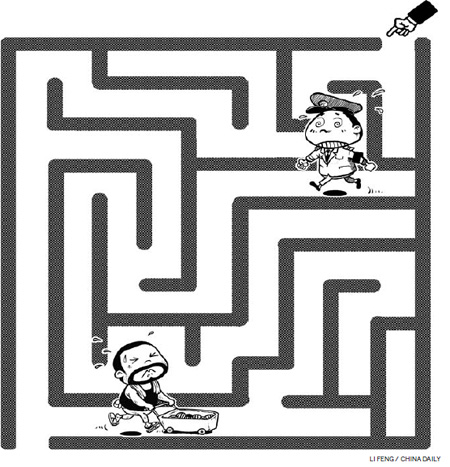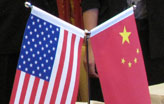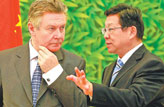Op-Ed Contributors
Debate: Chengguan
Updated: 2011-07-18 08:04
(China Daily)
Liu Neng
Building a truly beautiful city
Of all the problems faced by the urban management system in China, the most common is the violent conflicts between street vendors and officers of the urban administrative and law enforcement bureau, or chengguan.
It is not uncommon for chengguan officers to chase vendors away from streets through violent means, which deprives many people of their livelihoods. As a result, the victims do not let go of any chance to hit back at chengguan officers and leave some of them injured.
The irony is that chengguan officers take such actions to "maintain the beauty of a city".
The real cause of the conflict between chengguan officers and vendors is the rigid ideology some urban officials have and their twisted sense of aesthetics. By imposing their own idea of beauty on the cities they govern, they have created inconvenience, even caused trouble, for many residents.
The three key words many city authorities use to describe a beautiful city are uniformity, development and coerciveness. Uniformity is what they want their dream cities to have. Unfortunately, this weird sense of uniformity is making many Chinese cities lose their distinctive characteristics.
In the uniformity blueprint of cities, street vendors are considered an eyesore, which should be removed - with force if necessary. But are city bosses justified in executing their individual sense of "urban beauty" to deprive vendors of their livelihood?
City authorities' sense of development is guided by the blind pursuit of higher GDP. Most of the cities' bosses tend to equalize new, tall buildings with the best urban landscape. So they despise small and traditional buildings, and demolish old buildings to make way for high rises. This leads to conflicts between officials and occupants of such buildings, which at times can turn violent.
Perhaps the worst part of urban management is the use of coercion against vendors, who are treated as a wily and untamed lot that is difficult to deal with. Not having the patience to communicate with vendors to explain the need to keep streets and underpasses clear, many city authorities resort to violent means to remove them.
But the violent methods and high-handedness of chengguan officers have heightened tensions between city authorities and residents, especially vendors. The public and the media pay greater attention to chengguan officers' use of violence because it deals a serious blow to social justice.
A city full of highrises and uniform roads and buildings is what many city authorities dream of achieving, primarily because it could pave the way for their promotion or make their political future brighter. Many city authorities think, and wrongly so, that high-rises and uniform streets (together with higher GDP growth) will make it easier for them to realize their dreams.
But it is precisely this illusion of officials that has drawn the harshest public criticism against chengguan officers. Many officials make changes to a city's architectural landscape at will, without paying attention to residents' needs and complaints. The best way of solving this problem is therefore to change urban officials' mindset, that is, we need to redefine what cities in China should look like and what role, residents, vendors and chengguan officers should play in them.
I visited San Francisco a few years ago, and I think it is a good example for Chinese cities to learn from. San Francisco residents design their residential communities (which includes deciding the shape and size of residential buildings) through self-established and self-supported committees, and provide the complete system of civic services in return.
Instead of intervening in the affairs of residents, city governments in California concentrate on making rules, for example, setting the level of noise that a construction site can generate. And they respond to residents' complaints if the rules are violated by individuals or groups, including business organizations. This arrangement proved successful especially for reconstruction after the 1989 earthquake in California.
Such rules may not be ideal for a city, but at least they offer an alternative mode of successful urban development. Personally, I think that in a truly beautiful city, residents should have a greater say in city planning. Residents, not officials, should decide which part of their street is to be used for business purposes.
Moreover, the role of chengguan officers in cities should be more about service than regulation. More importantly, chengguan officers should be made to give up their extensive mode of urban management. In other words, residents should not feel the interfering existence of chengguan officers unless they are needed to help people or tackle specific problems.
The author is a professor of sociology at Peking University. This is an excerpt of his interview with China Daily's Zhang Zhouxiang.

(China Daily 07/18/2011 page9)

Specials

China-US Governors Forum
The first China-US Governors Forum is held July 15 in the Salt Lake City, the United States.

My China story
Foreign readers are invited to share your China stories.

Rare earths export quota
China kept its export quota at almost the same level as last year.